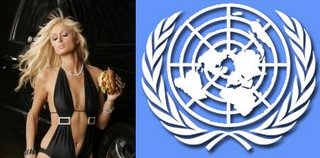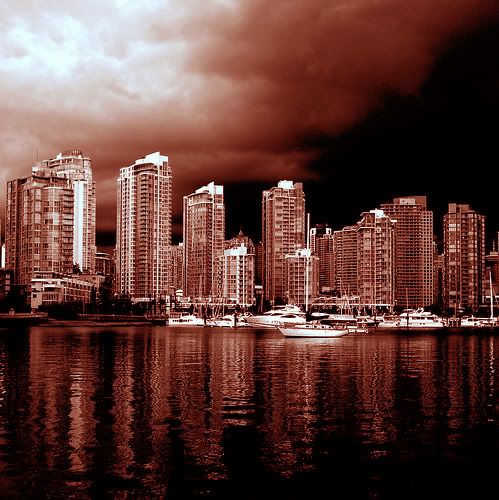unparfor: united nations paris hilton force.
 the situation in darfur is getting worse and worse by the day, despite the signing of the agreement a few months back. and now, khartoum is ordering the african union force out of darfur by the end of the month, citing essentially that the african union has no right to transfer their assignment to the united nations or any other international body.
the situation in darfur is getting worse and worse by the day, despite the signing of the agreement a few months back. and now, khartoum is ordering the african union force out of darfur by the end of the month, citing essentially that the african union has no right to transfer their assignment to the united nations or any other international body. the ideal of humanitarian intervention has taken a lot of hits as of late, and the whole darfur situation may be the final straw. now i'm not saying that nations and people will necessarily give up on humanitarian intervention, but it is quite clear that there are severe limits to the concept. limits, really, set by our own desires and what we can benefit from, and limits set by other international laws and regulations concerning nationality and sovereignty.
should we forcefully go in? at what point is it okay for nations to impose peace and good will on others? do we really even care enough to do so? what's in it for us, ultimately, by sacrificing time, money and lives to save people who, ultimately, probably have no bearing on our own lives? these are all questions that probably have answers that no one wants to really hear.
it appears that more and more, the media's attention has waned on the subject, which means the mass audience's attention span has also reached a limit. well, we tried, sort of; on to the next disaster, right? i mean, darfur is soooo last year. after all, there are over six billion people in the world, each of them suffering in their own way, right? i mean, just look at paris hilton: she's a walking catastrophe. somebody get her a u.n. food ration! and personally, if the vancouver canucks don't win the cup this year, my life will be a living hell.
for a recap on the whole situation, go to the bbc website, here. also, here's the article from the guardian unlimited:
Khartoum orders Darfur peacekeepers out
David Fickling and agencies
Monday September 4, 2006
Guardian Unlimited
Jamal Ibrahim, a foreign ministry spokesman, said the 7,000-strong African Union force deployed in the province would have to leave before the start of October.
"If they are unable to continue with their assignment in Darfur beyond September 30, then they have to leave before that date," he said. "At the same time, they have no right to transfer this assignment to the UN or any other body. This right rests only with the government of Sudan."
Noureddine Mezni, a spokesman for the African Union, said Khartoum had not yet informed the union of its decision.
The foreign ministry spokesman said the government would pursue its own plans to pacify Darfur. "Sudan will proceed with implementation of the Darfur peace agreement according to its own plan to restore security and stability in the region."
Fighting in the province, along Sudan's western border, has resulted in at least 200,000 deaths in three years and displaced 2.5 million people. Last year the conflict spilled over into neighbouring Chad and briefly brought the two countries to the brink of war, while in 2004 the UN labelled the situation the world's worst humanitarian crisis.
The conflict began in 2003 when a collection of local rebel groups began attacking Sudanese government offices. Brutal retaliation from the government-backed Janjaweed militia followed, with thousands of people killed and villages torched.
Khartoum has refused repeated efforts to establish a 20,000-strong UN peacekeeping force in the province, and on Thursday it rejected the most recent UN proposal to send in troops.
In a speech at the weekend the president, Omar Bashir, described the proposed UN mission as "old-time colonialism in new clothes", while his vice-president, Ali Osman Taha, held up Hizbullah as an example to the Sudanese people of how to resist UN troops.
"We have options and plans for confronting the international intervention," he was quoted as saying by the state news agency, Suna. "We are prepared for all possibilities."
Local papers reported that crowds of demonstrators burned US and British flags and chanted anti-UN slogans in El Fasher, the capital of North Darfur, while the state's governor donned combat fatigues and promised to set up training camps for locals to resist any UN force.
There have been reports of further fighting in the region over the past week, with a major government offensive involving thousands of troops and Janjaweed militias reportedly claiming 20 lives and displacing more than 1,000 people.
The African Union force is in the region patrolling a 2004 ceasefire between the government and rebel groups that is technically in force but openly being flouted.
In May, long-running talks saw a peace agreement between the government in Khartoum and the Sudan Liberation Army, the largest of the rebel groups. But violence has grown since July as SLA commanders began turning against their former rebel allies, and the outcome of the agreement caused further factionalism between tribal and rebel groups.
Jan Pronk, the leader of the UN mission in Sudan, said last month that the picture was "bleak" in the region.
"The situation is worse than in the last three months before the signing of the agreement, and it is deteriorating," he wrote on his blog.
"The agreement was meant to cement the parties together, but it has become a source of further disruption."
+Mini.jpg)


|